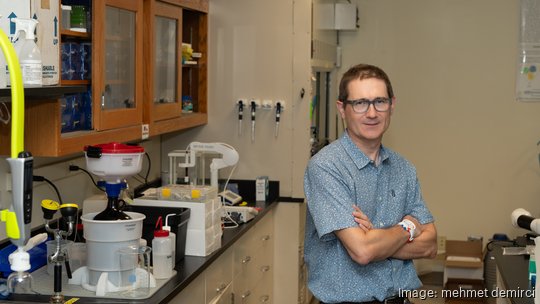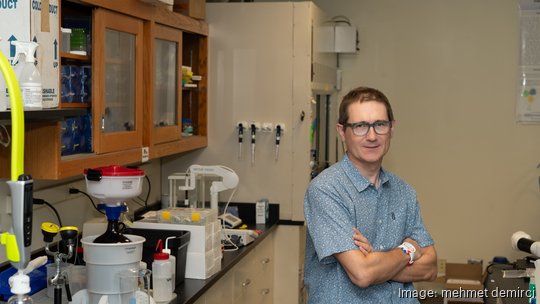
While many companies are downsizing office space, a small technology company in Raleigh recently doubled its footprint at North Carolina State University's Centennial Campus as it sees growing demand and a potential nine-figure valuation.
Collaborations Pharmaceuticals in May moved into a 2,700-square-foot office on Varsity Drive, expanding on the company's existing 2,400-square-foot space on Main Campus Drive. The move comes as Collaborations sees rising interest for its artificial intelligence technology from companies in the drug development and consumer products industries.
Prior to the expansion, the company of about 12 employees was operating out of three laboratories, two of which were essentially converted to office space. With the new offices, the company has opened its other spaces for lab activities.
Since forming in 2017, Collaborations has focused on software development and drug discovery. It has created different software tools — utilizing artificial intelligence and machine learning — that the company uses to create its own drug development pipeline, while also making the software available to other companies through licensing deals.

The company's most advanced project is an enzyme replacement therapy for Batten disease, a rare genetic disorder that affects the brain and nervous system and that typically begins in childhood. Collaborations recently received about a $4 million grant from the National Institute of Neurological Disorders and Stroke, part of the National Institutes of Health, to support this program.
This grant is the largest in the company's history and will allow it to produce what is called Good Manufacturing Practice material, meaning that it can be used in humans. This would position the company to move the program into a clinical trial, which would likely involve another grant from the NIH.
Collaborations has largely been supported by grants — totalling more than $21 million — from agencies like the NIH or the U.S. Department of Defense, CEO Sean Ekins said. Collaborations has never received any sort of venture capital or private equity dollars.
Collaborations has spoke with private equity firms in the past, but the conversations typically focused on its software sales, rather than the broader potential of the company's technology and its applications, Ekins said. A large Japanese firm approached the company about a potential acquisition, so they reached out to the Small Business and Technology Development Center in Raleigh for help determining a valuation, he said.
The range was in the hundreds of millions of dollars, he said.
"We felt initially it was kind of crazy, but then maybe not so crazy when you think about where the space is," Ekins said. "And the valuation from the Japanese company was more on our software sales currently and not projecting the value it could add to this multi-national, massive Japanese company."
Conversations with the company are ongoing, Ekins said, but he declined to disclose the name.
Collaborations has recently become more involved in contract services. It has seen an increase in the number of organizations seeking solutions to specific problems, like designing molecules, Ekins said. In October, the biotech Can-Fite BioPharma (NYSE American: CANF) announced an agreement with Collaborations to develop anti-cancer drugs utilizing the company's generative AI and machine learning tools.
The latter is an area where Collaborations sees real possibilities. The global consumer product company Reckitt recently invited Collaborations to participate in a science symposium where Ekins spoke about how the company's technology can be used for polymer design.
"I don't think people realize what AI could do on the molecule design side, because everyone is focused on the drug piece," Ekins said. "And now all of a sudden we can design polymers. And polymers are massive, they're in everything."
